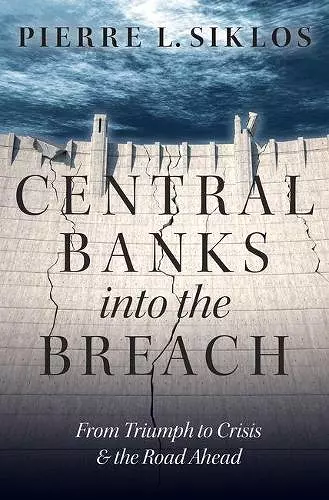Central Banks into the Breach
From Triumph to Crisis and the Road Ahead
Format:Hardback
Publisher:Oxford University Press Inc
Published:12th Oct '17
Currently unavailable, and unfortunately no date known when it will be back

Central banks play an important role in the course of national economies and the global economy. Their leaders are regularly feted or vilified, their policy pronouncements highly anticipated and routinely scrutinized. This is all the more so since the global financial crisis. The past fifteen years in monetary policy is essentially the story of two mistakes and one triumph, argues Pierre L. Siklos, a professor of economics at Wilfrid Laurier University. One mistake was that central bankers underestimated the connection between finance and the real economy. The other was a failure to realize how inter-connected the world's financial system had become. The triumph, in turn, was the recognition that price stability is a desirable objective. As a result of the financial crisis, central banks stepped into the breach to provide services other institutions were unwilling or unable to carry out. In doing so, the responsibilities for governing monetary policy and financial system stability became more elastic without due consideration for the appropriateness of the division of responsibilities. Central banks no longer influence just prices they also change financial system quantities. This leads to rising policy uncertainty. And low economic growth, an insufficiently unsubstantiated expansion of central bank responsibilities, and worries over future financial instability are sources of concern that contribute to a loss of confidence in the monetary authorities around the globe. Because no coherent new framework for central bank policy has since emerged, central banking is not broken, but it is in need of repair. Central Banks into the Breach provides an overarching analysis of the current and vulnerable state of central banks and offers potential solutions to stabilize the uncertain future of central banking.
Yes, central banks did step 'into the breach' during the financial crisis and, as Pierre Siklos argues persuasively in this book, found themselves in a strange new world. Siklos' scholarship and knowledge of central banking are hard to match. Few people in the world could have written this book. * Alan Blinder, Princeton University *
The story of the role of central banks over the last decade is fascinating, and Pierre Siklos is very well placed to tell it. His great strengths are that he understands the important links between politics and central bank operations, and he gives a proper emphasis to the important development of the macro-prudential pillar of monetary policy. * C.A.E. Goodhart, Professor in the Financial Markets Group, London School of Economics *
Central banks are changing. At the peak of their prestige during the Great Moderation, their target was low inflation, with financial stability and full employment expected to follow. Those expectations were disappointed by the Great Financial Crisis and the weak growth that followed. Professor Siklos' insightful analysis is recommended to those who would understand the experiences of central banks during these difficult times and their attempts to adapt to the new intellectual and structural environment. * John Wood, Reynolds Professor of Economics, Wake Forest University *
ISBN: 9780190228835
Dimensions: 163mm x 236mm x 31mm
Weight: 592g
344 pages